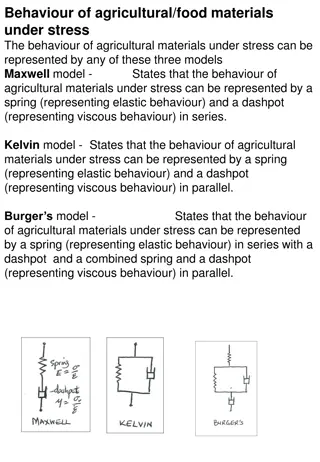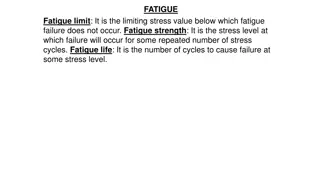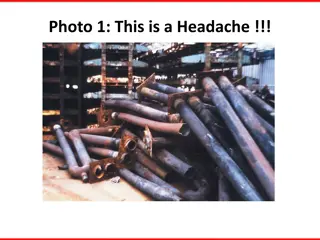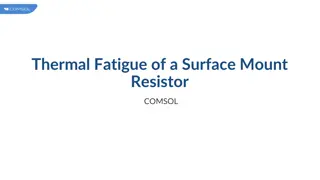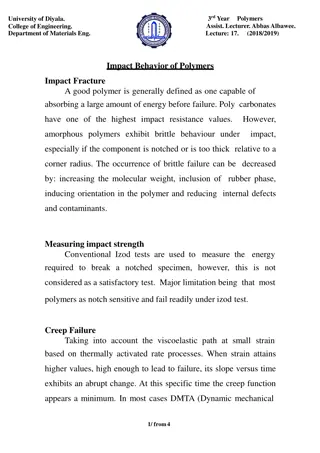In New Alzheimer | healthcare
Alzheimer\u2019s treatment anticipated to receive approval soon, the nonprofit Alzheimer\u2019s Association has released the final version of its new diagnostic creep criteria for the disease.
0 views • 2 slides
Understanding Agricultural Materials Behavior under Stress
Agricultural materials exhibit different behaviors under stress, which can be represented by models such as Maxwell, Kelvin, and Burger's models. The laboratory method for determining creep in a 4-element Burger's model is explained. Additionally, the drying process of agricultural materials, includ
0 views • 4 slides
Understanding Mass Wasting: Geomorphic Processes and Causes
Mass wasting, a geomorphic process driven by gravity, involves the movement of soil, rocks, and debris downslope. Landslides are common triggers, caused by factors like erosion and gravitational pull. Different types of mass movements, from gradual creep to rapid landslides, shape the Earth's surfac
1 views • 32 slides
Project Scoping and Validation for Successful Project Management
Project scoping involves gathering information, defining key design parameters, and identifying features to meet stakeholder requirements. Validating the project scope helps prevent scope creep and changes, leading to cost reduction and shorter schedules. Steps include resource determination, data g
3 views • 13 slides
Essential Considerations for Designing Bonded Joints
Explore the intricacies of bonded joints, from understanding the advantages of adhesive over mechanical joints to analyzing factors like creep, fatigue, and joint design. Learn about loading in shear, adhesive selection, stress distribution, and practical considerations for optimizing the performanc
0 views • 12 slides
Understanding Fatigue in Materials Engineering
Fatigue in materials engineering is a phenomenon where failure occurs under repeated stress cycles. Factors influencing fatigue life include mean stress, surface effects, thermal and corrosion fatigue. Creep behavior at elevated temperatures is also crucial. Recognizing these aspects is vital for de
0 views • 11 slides
Analysis of Alloy Performance in Various High-Temperature Conditions
The content provides a detailed analysis of different alloy properties and performance under high-temperature conditions such as carburization, oxidation, and creep. Various figures depict the behavior of alloys in terms of resistance, stress, and rupture. This information is valuable for understand
0 views • 11 slides
Thermal Fatigue of a Surface Mount Resistor: A COMSOL Analysis
A COMSOL analysis is conducted on the thermal fatigue of a surface mount resistor subjected to thermal cycling. The study focuses on the solder joint, structural integrity, and life prediction using fatigue models. Various aspects of the resistor assembly, including material composition, dimensions,
0 views • 13 slides
The Evolution of Decision-Making and Sovereignty in the EU Integration
The shift from political to judicial decision-making in the pursuit of EU economic integration has raised questions about sovereignty within the EU framework. Key topics include the division of competences outlined in the treaties, the rise of the judicial sovereign, expansion of EU sovereign throug
0 views • 7 slides
Understanding Rheology in Dental Materials
Rheology is a crucial aspect in dentistry as it deals with the flow properties of various dental materials, including liquids like molten alloy and impression materials. Viscosity plays a key role, determining how materials flow and behave. Different fluid classifications based on rheology, such as
0 views • 15 slides
Understanding Impact Behavior and Fracture Energy of Polymers
Polymers with high impact resistance are sought after for their ability to absorb energy before failure. Factors affecting impact behavior, such as molecular weight and orientation, are discussed. Methods for measuring impact strength and creep failure are explored, along with the advantages of blen
0 views • 5 slides
Understanding Aeolian Processes and Landforms
Aeolian processes are crucial in arid and semi-arid regions, involving erosion, transportation, and deposition by wind. Factors like wind velocity, grain size, rock composition, and vegetation influence erosion. Different types of wind erosion include deflation, abrasion, and attrition. The transpor
0 views • 18 slides
Understanding Viscoelasticity in Materials
Viscoelastic materials exhibit properties of both elastic solids and viscous fluids, displaying time-dependent behavior under deformation. This unique behavior impacts various applications, such as device and structure design, emphasizing the importance of comprehending viscoelasticity. Real-life in
0 views • 10 slides
The Watergate Scandal: A Presidential Crisis
The Watergate scandal of 1972 involved a break-in at the Democratic National Committee headquarters by members of the Committee to Re-elect the President (CREEP), setting off a chain of events that led to President Nixon's resignation. The cover-up, investigations, Senate hearings, demands for tapes
0 views • 6 slides
Common Plumbing Issues in Anaheim Homes and How to Fix Them
Plumbing problems feel like a ticking time bomb. They creep in when you least expect it, messing up your day, sometimes even causing significant damage. For Anaheim homeowners, this is one of the reasons you want to understand such issues and their f
0 views • 5 slides

